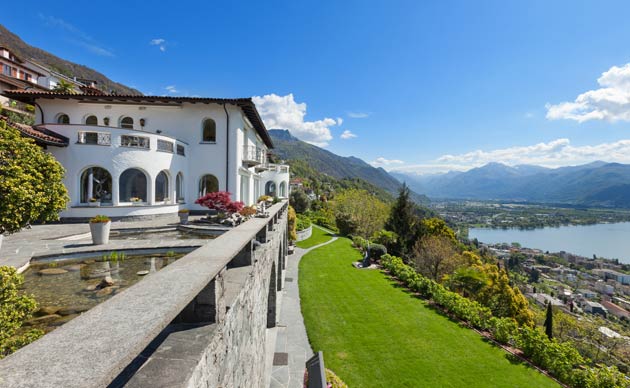Guide to the Swiss property market

Owning a ski chalet in the Swiss alps or buying a character apartment in the historic centre of Zurich may be a dream for many expats and property investors, however buying a property in Switzerland is not as easy as in other European countries. Also, the Swiss property market is not without its challenges. Although it didn’t suffer much during the 2008 banking crisis, there are things to consider before making the final decision.
Is the Swiss property market bubble about to burst?
The most desirable regions of the country, such as Zurich, areas around Lake Zug, Lake Lucerne and Lake Geneva as well as in the “slopeside” tourist destinations in the Alps, are officially in a property bubble.
You would think that a bursting property bubble is impossible to come by in such a traditionally stable economy as Switzerland, however, the house prices have been on a steady rise during the last 17 years, which would be perfectly fine under a booming economy. Unfortunately, Switzerland is far from booming. In fact, the economy shrunk by 0.1% in the Q3 of 2015 raising questions about the stability of the country’s economy.
Apart from the banking crisis in 2008, Swiss economy has grown slowly but steadily year in year out. The problems begun when a decision was made to remove the cap on the Swiss franc / euro exchange rate. Although it will lead to a stronger franc in the long run, the ensuing chaos sent shockwaves throughout various sectors of Swiss economy. Only the housing market didn’t respond. House prices climbed around 2% during this period, which just seemed to re-establish the idea of the property bubble blowing out of control.
Union Bank of Switzerland (UBS) recently released a statement expressing worries over the local property market stating that negative interest rates have created increased demand for investment property adding new challenges to the sector. UBS is expecting the property prices to fall during 2017.
Other experts, however, seem not too worried about the situation claiming that Switzerland is able to sustain its long-term growth and that property prices are going to continue to increase for many years to come.
Who can buy a property in Switzerland?
There are not that many opportunities for a property investor in Switzerland. Not only there’s a high demand for investment properties at the moment, there is also a range of restrictions preventing investors from snapping up the most lucrative real estate deals.
You can buy in Switzerland with few restrictions if you are an EU or EFTA national with a residence permit or if you have a Swiss C Residence Permit. Those with Swiss B Permit are allowed to purchase a single property as their primary residence.
If you simply want to buy a holiday home for your own enjoyment, the process is not that difficult, although foreigners still need permission from the cantonal authorities. The house has to be located in a zone designated as a holiday resort. Some zones have additional specific restrictions in terms of quotas and even restrictions that allow foreigners to only buy property that are foreign-owned meaning that you can’t buy from the locals.
You should also be prepared to have little control over renting out your holiday abode while you’re not using it. Holiday rentals are permitted only during certain periods that will be designated by the cantonal authorities.
They also place a restriction on the square footage of a permissible property purchase. The net floor space (excluding the balconies, cellar and attic) cannot exceed 1,800 sq ft. If you’re after a bigger dwelling, you will be asked to prove a need.
In some circumstances EU nationals can also buy a house in Switzerland while only having a Swiss G Permit that allows them to work in Switzerland. In this case they have to occupy the house during the time they work in Switzerland.
There’s good news for those planning on starting a business in Switzerland as commercial premises can be bought as permanent business establishments without any restriction. However, the devil is in the detail: rental or leasing of the commercial premises is not considered “permanent business”. Purchasing a property for the sole purpose of obtaining a trading address also doesn’t meet the requirements. Your best way forward is checking the Swiss Land Registry website for up-to-date regulations.
Of course, it goes without saying that homebuyers are expected to pay in cash. Getting a mortgage in Switzerland is virtually impossible. Before the banking crisis you could get an 80% value mortgages, which is down to just 25%. That’s why so few locals are able to afford a mortgage adding more tension to the already overheated sector.
What does the future hold for the Swiss property market? At the end of the day, each investor needs to make their own decision whether investing in Swiss property is a good idea or if it’s better to sit out and wait for the situation to develop.
If you’re moving to Switzerland, find out how our international removals team can help to arrange packing, storage and transportation on your behalf.



